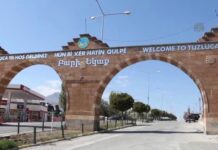WikiLeaks – Armenia No 13
SENSITIVE
SUBJECT: HOMOSEXUALS REPORT MINOR IMPROVEMENTS IN YEREVAN — SAME DISCRIMINATION ELSEWHERE
¶1. (U) Sensitive but unclassified. Please protect accordingly.
——-
SUMMARY
——-
¶2. (SBU) Despite new legislation that de-criminalized homosexuality in Armenia, societal discrimination remained an obstacle for homosexuals in 2003. Members of the homosexual community told Emboffs [Embassy officials] December 24 that homosexuals continue to face intolerant attitudes and severe discrimination in rural areas and in the military. A local human rights NGO said that cases of police harassment of homosexuals now involve blackmail and extortion more than violence. Both noted, however, that the overall situation had improved and that cases of harassment had abated somewhat during the past year in Yerevan. End summary.
———————————
INTOLERANT ATTITUDES STILL STRONG
———————————
¶3. (SBU) Armenia adopted a new criminal code in August 2003 that removed Soviet-era provisions criminalizing homosexuality. This move was part of the GOAM’s [Government of Armenia] response to pending Council of Europe membership obligations. Despite this new legislation, societal discrimination remained the major obstacle for homosexuals in Armenia. Armenians openly refer to homosexuals as “immoral” people whose behavior contradicts “natural Armenian character.” Homosexual community members tell us that some politicians and local leaders deny that homosexuals live in Armenia. They insist that only Diasporan Armenians from the United States or Europe frequent the well-known homosexual nightclubs in Yerevan.
¶4. (SBU) Members of the homosexual community told Emboffs December 24 that these attitudes are most serious in rural areas where homosexuals face ridicule from family and neighbors. They said that homosexuals in these areas have difficultly finding steady employment and must conceal their sexual orientation if they want to participate in local government or business. An open, formal homosexual community network does not exist in rural areas because of these conditions. Some report, however, that a group of homosexuals plans to organize a support group in the northern city of Gyumri. (Note: Lesbian support groups have organized on a national level with some success, but maintain a relatively low profile. These groups tell Embassy human rights contacts that they face less severe discrimination than do homosexuals but that intolerance for their lifestyle is still common. End note.)
—————————————
HARASSMENT BY POLICE/MILITARY OFFICIALS
—————————————
¶5. (SBU) Mikail Danielyan, Chairman of the Helsinki Association, reported that police officers continue to harass homosexuals in Armenia. (Note: Danielyan is one of the few human rights activists who sees this issue as part of his mandate. End note.) He reported at least three cases in which police attempted to blackmail men by threatening to publicly expose them as homosexuals to their families and friends. Danielyan said that the nature of police harassment had changed during the past year. Police officers now use less violent tactics but pressure homosexuals for information about homosexuals, especially married men, in high-ranking business or government positions from whom they can extort larger amounts of money.
¶6. (SBU) Danielyan said that harassment of homosexuals in the military remained a significant problem. He noted that homosexual recruits reportedly face physical and psychological abuse by officers and fellow soldiers. Danielyan outlined cases in which homosexual soldiers were sent to psychiatric clinics for treatment of “sexual perversion.” He said he was unaware of public statements by high-ranking military officials against homosexuals but that harsh treatment for homosexuals was the norm in the military.
—————————-
CONDITIONS BETTER IN YEREVAN
—————————-
¶7. (SBU) Young men wanting an openly homosexual lifestyle are often forced to move to Yerevan where (as our contact notes) conditions for them have improved over the last year. Homosexual community members said that police harassment in the city had diminished during 2003 and that they do not feel that their lives are in danger while in the city. They said that Yerevan’s increasingly cosmopolitan social scene now allows for more opportunities for expression and congregation. While workplace discrimination remains a problem, they claimed that Yerevan offered a range of employment possibilities if employers or co-workers became hostile toward them. One well-known member of Armenia’s homosexual community told us that the situation in Yerevan had improved in part due to the new legislation but mostly because “people are realizing we’re not going away anytime soon.”
——-
COMMENT
——-
¶8. (SBU) The lack of formal advocacy organizations complicates the already difficult situation that homosexuals face in Armenia. Prominent members of the homosexual community say they have not yet discussed their lifestyle with family and friends, making them reluctant to organize a publicly recognized network. It is difficult to gauge official GOAM treatment of homosexuals under the law without such a group. The lack of a newsletter or regular meeting continues to limit the ability of international organizations to intervene or engage the community on a formal level. It remains clear, however, that treatment of homosexuals is not yet part of the general discussion of human rights in Armenia. Armenia’s new legislation can only be as effective as the willingness of Armenians in and out of the homosexual community to engage in a public dialogue on the subject.
WALKER













